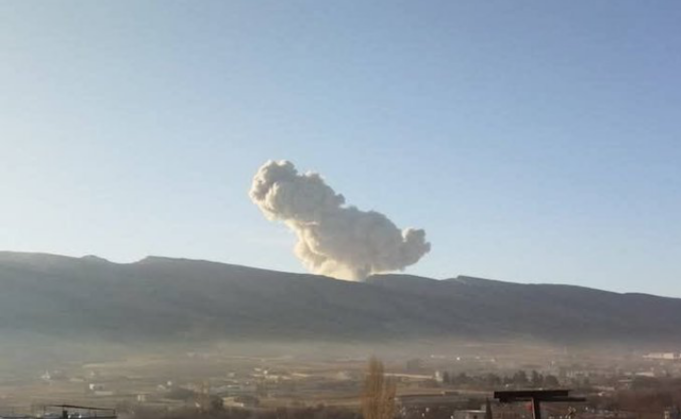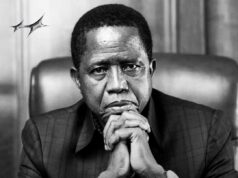Israel’s foreign minister says it has struck suspected chemical weapons sites and long-range rockets in Syria in order to prevent them from falling into the hands of hostile actors.
“The only interest we have is the security of Israel and its citizens,” said Israel’s foreign minister Gideon Saar on Monday.
“That’s why we attacked strategic weapons systems, like, for example, remaining chemical weapons, or long-range missiles and rockets, in order that they will not fall in the hands of extremists.”
He spoke after Syrian rebels entered Damascus, leading to the overthrow of President Bashar al-Assad’s government after nearly 14 years of civil war. This development has raised hopes for a more peaceful future but also concerns about a potential security vacuum in the country, which remains divided among various armed groups.
Airstrikes have been reported in the area of the Mezzeh military airport, southwest of the capital, on Sunday. The airport has previously been targeted in Israeli airstrikes, but it was not immediately clear who launched the latest strike.
Sa’ar did not provide details about when or where the strikes took place.
Israelis have expressed cautious optimism following the fall of President Bashar al-Assad, a key ally of Iran and Lebanon’s Hezbollah terrorist group. While welcoming the potential for reduced hostile influence near their borders, there is concern about the ensuing power vacuum and the rise of various armed factions within Syria.
Israel has conducted hundreds of airstrikes in Syria over recent years, primarily targeting sites it identifies as linked to Iran and Lebanon’s Hezbollah militant group, both of which were key allies of President Bashar al-Assad. While these strikes aim to disrupt the military capabilities of hostile forces, Israeli officials seldom comment on specific operations, maintaining a policy of ambiguity regarding their actions.
In 2013, Syria agreed to surrender its chemical weapons stockpile following international outrage over a chemical attack near Damascus that killed hundreds of people. However, it is widely believed that the Syrian government retained portions of its chemical arsenal and faced accusations of deploying such weapons in subsequent years, further intensifying concerns over their use in the protracted civil war.
The U.S. Central Command (CENTCOM) announced that it launched dozens of airstrikes on Islamic State (ISIS) camps and operatives in central Syria. The strikes, conducted on Sunday, aimed to “disrupt, degrade, and defeat ISIS,” preventing the group from taking advantage of the current situation to reorganize or conduct external operations.
Using B-52 bombers, F-15s, and A-10 aircraft, the strikes targeted over 75 locations linked to ISIS activities. CENTCOM reported no civilian casualties and stated that damage assessments are underway.
U.S. leaders, including President Biden, have confirmed the United States is collaborating with Middle Eastern nations to prevent chemical weapons, previously controlled by the Assad regime, from falling into the hands of hostile entities.
“We will support Syria’s neighbors—Lebanon, Iraq, Jordan and Israel—from any threat that could arise from Syria,” Biden said in a speech on Sunday.
Secretary of State Tony Blinken said in a statement Sunday “We will support international efforts to hold the Assad regime and its backers accountable for atrocities and abuses perpetrated against the Syrian people, including the use of chemical weapons.”
The Turkish-backed Syrian National Army (SNA) launched an offensive against the Syrian Democratic Forces (SDF) in the northern city of Manbij on Dec. 6, following a similar operation that expelled SDF fighters from Tal Rifaat
Turkish security officials have stated that “control of Manbij has been secured,” though further details were not provided. These officials spoke anonymously, adhering to Turkish regulations.
Turkey considers the SDF, primarily composed of the Syrian Kurdish militia YPG, as an extension of the banned Kurdistan Workers’ Party (PKK), which is designated as a terrorist organization by Turkey. Despite this, the SDF has been a crucial ally of the United States in combating the Islamic State group.
The recent military actions by Turkish-backed forces have intensified tensions in northern Syria, complicating the region’s security dynamics and impacting international efforts to maintain stability.
Previously it was reported that Iran-backed militias had also joined the fighting in Syria, although in the past week Hezbollah and other groups sponsored by Iran are believed to have been largely withdrawn from the country.




